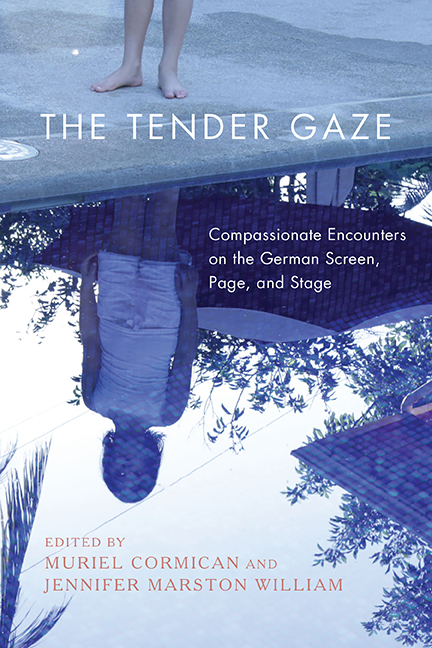Book contents
- Frontmatter
- Contents
- Acknowledgments
- Introduction: The Tender Gaze
- 1 Toward a Theory of the Tender Gaze: Affect, Critical Insight, and Empathy in Contemporary German Cinema
- 2 The Tender Gaze, Embodied Politics, and Perspective-Taking in German Postdramatic Theater
- 3 Face to Face: Race, Gender, and the Gaze in Mo Asumang’s Die Arier
- 4 “Risse, hinter denen man einen Kern entdeckt, der so ähnlich ist wie die Herzen von uns allen”: The Tender Gaze in Umut Dağ’s Risse im Beton
- 5 Looking through the Eyes of Empathy: Encouraging a Culture of Caring and Compassion in Doris Dörrie’s Keiner liebt mich
- 6 The Tender and Transgressive Beast Within: Escape Narratives in Films by Krebitz, Stuber, and Speckenbach
- 7 Looking at Looking in Margarethe von Trotta’s Das Versprechen
- 8 A Queer Phenomenology of Gender in Maren Ade’s Alle Anderen and Toni Erdmann
- 9 Rilke’s “Schauen”
- 10 Pity Stares or Tender Gaze? Seeing Disability in Nineteenth-Century Austrian and German Literature
- 11 The Sociohistorical and Gendered Implications of Gazing Tenderly in Ludwig Tieck’s “Liebeszauber”
- 12 Mothering, Animals, and the Surveillance State in the Anthropocene: An Ecofeminist Reading of Birgit Vanderbeke’s Die Frau mit dem Hund
- Notes on the Contributors
- Index
8 - A Queer Phenomenology of Gender in Maren Ade’s Alle Anderen and Toni Erdmann
Published online by Cambridge University Press: 05 October 2022
- Frontmatter
- Contents
- Acknowledgments
- Introduction: The Tender Gaze
- 1 Toward a Theory of the Tender Gaze: Affect, Critical Insight, and Empathy in Contemporary German Cinema
- 2 The Tender Gaze, Embodied Politics, and Perspective-Taking in German Postdramatic Theater
- 3 Face to Face: Race, Gender, and the Gaze in Mo Asumang’s Die Arier
- 4 “Risse, hinter denen man einen Kern entdeckt, der so ähnlich ist wie die Herzen von uns allen”: The Tender Gaze in Umut Dağ’s Risse im Beton
- 5 Looking through the Eyes of Empathy: Encouraging a Culture of Caring and Compassion in Doris Dörrie’s Keiner liebt mich
- 6 The Tender and Transgressive Beast Within: Escape Narratives in Films by Krebitz, Stuber, and Speckenbach
- 7 Looking at Looking in Margarethe von Trotta’s Das Versprechen
- 8 A Queer Phenomenology of Gender in Maren Ade’s Alle Anderen and Toni Erdmann
- 9 Rilke’s “Schauen”
- 10 Pity Stares or Tender Gaze? Seeing Disability in Nineteenth-Century Austrian and German Literature
- 11 The Sociohistorical and Gendered Implications of Gazing Tenderly in Ludwig Tieck’s “Liebeszauber”
- 12 Mothering, Animals, and the Surveillance State in the Anthropocene: An Ecofeminist Reading of Birgit Vanderbeke’s Die Frau mit dem Hund
- Notes on the Contributors
- Index
Summary
MAREN ADE'S FILMS explore the play between humor, irony, and sentimentality, in order to unsettle viewers’ expectations regarding cinematic social relations and interactions. The role of humor in Ade's films cannot be neatly mapped to either irony or sentimentality, nor can one speak of clearly masculine or feminine uses of humor. Far from being binary opposites, irony and sentimentality flow into one another in Ade's films, dynamically defining each other in complex ways that are dependent on multiple factors, including the gendered positionality of the characters in relationship to their social class, ethnicity, and age. Depending on such factors, as well as on the potential offered at specific moments for individuals to assert agency, humor and sentiment can serve either to break down gendered hierarchical boundaries between individuals and deterritorialize gendered spaces or to reinforce boundaries. Ade's films are in part an exploration of how and why such processes occur, as well as aesthetic experiments in creating the very moments that enable human agency to transgress identity categories. Her cinematic aesthetic undermines the use of humor as a device to avoid deep exploration of characters’ complex relationships to their own past and present gendered positionalities; through careful contextualization of characters as individuals with histories, Ade's mise-en-scène and long takes invite viewers’ lingering, thoughtful, and thus “tender” gaze on the gendered bodies on screen.
Ade explores the potential of humor and affect for either disrupting or reinscribing gendered hierarchies of power in a neoliberal economy in which identity and consumption have become coterminous and in which gendered hierarchies are far from being leveled. Both Alle Anderen (Everyone Else, 2009) and Toni Erdmann (2016) reveal an asymmetry in the use and effect of humor and sentiment between men and women; at the same time, these films attempt to break viewers’ asymmetrical relationship to masculine and feminine performances of humor and sentimentality. Ade uses cinematic techniques that can be productively analyzed in terms of the concept of the tender gaze elaborated in this volume, for example the use of ambient sound and diegetic music rather than bombastic soundtracks, lingering camera gazes that zoom in and out of closeup to explore characters within the context of their environments, as well as long silences and awkward dialogues.
- Type
- Chapter
- Information
- The Tender GazeCompassionate Encounters on the German Screen, Page, and Stage, pp. 143 - 158Publisher: Boydell & BrewerPrint publication year: 2021

